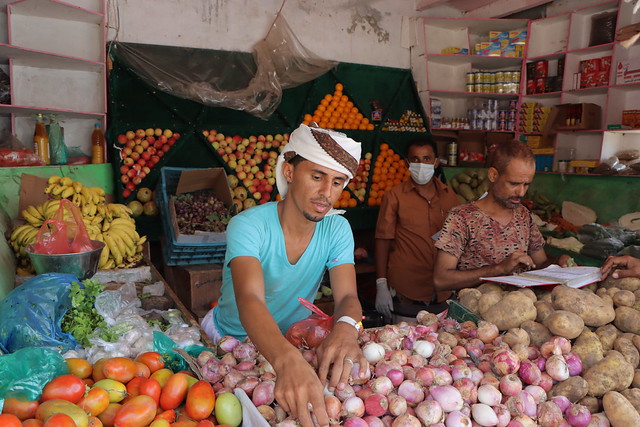Yemen: Land, Sea, Airwaves - livelihood-specific COVID-19 sensitization
In Yemen, the COVID-19 crisis compounded a number of overlapping challenges. To reduce the primary impacts of the pandemic, curbing the spread of infection was critical. Rapid and mobile sensitization interventions were mounted to target specific livelihoods, from roadside fruit vendors and fishermen out in boats along the coasts, to livestock breeders and smallholder farmers traveling between fields and marketplaces. Working with NGO Implementing Partners, FAO-supported interventions used a multi-pronged approach to deliver and disseminate virus mitigation guidance. In-person trainings were aided by the distribution of brochures, fliers, posters, and protective hand and face coverings. Knowledge traveled by land, water, and air—airwaves, that is. Site-specific awareness raising campaigns were also complemented by informative COVID-19-focused radio broadcasts. Virus mitigation strategies were then shared among families and community members, allowing COVID-19 safety guidelines to spread, in place of the virus.
This gallery documents livelihood-specific impacts of the COVID-19 crisis in Yemen and an emerging evidence base around sensitization responses. Interviews were carried out throughout several governorates of Yemen with a total of 18 beneficiaries and stakeholders, including FAO-supported Implementing Partner NGOs. This in-country documentation was completed as part of the 18-month-long USAID-funded project "Supporting critical agricultural value chains in food crisis countries in the context of COVID-19” focused8 on providing sensitization tools to eleven focus countries and capturing emerging country-level RCCE responses to the COVID-19 crisis. The project originated under the banner of Pillar IV of the FAO Global Humanitarian Appeal for COVID-19, “Ensuring food supply chain actors are not at risk of virus transmission.” Three documentary films on Yemen—two live, one animated—were produced as part of the same set of knowledge visibility outputs, all created by KORE, the knowledge management and sharing team of the Office of Emergencies and Resilience.
21/03/2022

